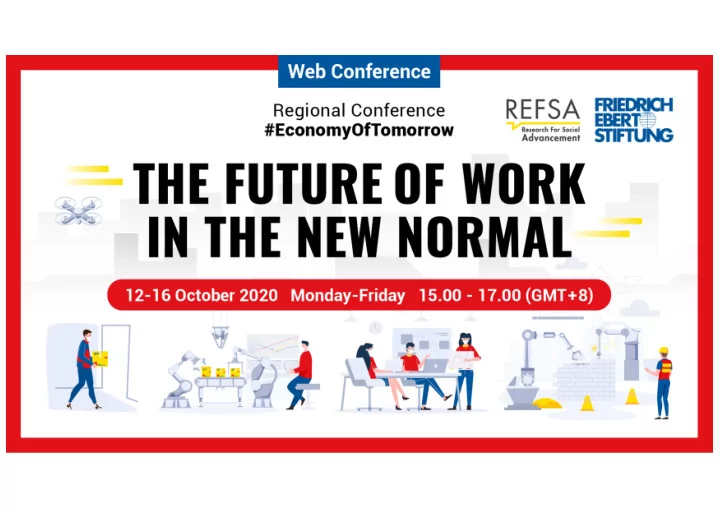

Session 3A: Spotlight on the Gig Economy • Historically, informal work is nothing new. It was actually prevalent in the pre-industrial employment structure. • However, we are now dealing with a more complex & volatile world. We are witnessing a gradual shift towards temporary employment & contract work, as larger companies manage their risks and had to adjust employment patterns. • Pace of obsolescence of skills is also unprecedented. The kind of skills we need might also be temporary. • More automation, leading to hollowing out of middle income jobs. Less need for steady manufacturing/office jobs.
Gig economy - trends ● Globally, there is a sharp rise in the participation of the gig economy, with microtask platform work increasing 14% per annum. ● Gig workers are usually comprises of well educated, male. However in Malaysia the majority of gig workers are young, highly educated female with median age of 29 (54%). Interestingly, the largest share of workers are degree holders (27.5%), followed by SPM holders ● Gig workers often share 5 common features i.e. uncertain working hours, blurred work life boundaries, economic and social insecurity, imbalance of power between firms and workers, and unequal taxation burden between firm and workers ● Apart from traditional gig workers, there are digital gig workers
Impact and challenges of Gig Economy Employer based --> employee based training. Workers become more responsible • for their own reskilling. Mismatch of what’s available in the job market and the labour force at a global • scale, even in a knowledge based economy only produce 25% high skill work. A rethink on education needed, tertiary education no longer guarantee of jobs. Future of work requires flexibility in skills and ability to pivot to different careers. While developed countries have better social protection, a lot of countries like • Malaysia build social protection systems around formal work. In some countries regardless of the form of your work, contribution to the social protection system is still needed The legal definition of employment as well as issue on financing • unresolved, but there’s a recognition that more needs to be done at policy level.
The case of Gojek Transport development in Indonesia shows a rapid growth of motorbike taxi (ojek), in part due to the ● poor public transport system, but also because of the development of smartphone and the renewed policy in telecommunication after Suharto’s collapse. Today the number of phone owned is more than number of citizens in Indonesia ● There has been an increased in the precariats (unemployed, vulnerable and informal workers), which are easily absorb into the gig economy of transport sector, and lead to the spur in the gig economy (for transportation) in Indonesia ● Emergence of Apps such as Gojek and Grab has given rise to discontent, with legal controversies as there is no oversight over these companies. ● Are app-based driver micro entrepreneurs or precariat 4.0? Drivers have little bargaining power, as tariff is decided by the company or the app, workers are controlled by the company through the algorithms. The workers also lack contracts, hence no legal obligation on the part of the company ● Gig workers achieve more bargaining power if informal drivers are recognised/legitimized. They should also be provided with an avenue for negotiation, and build solidarity among drivers by joining significant association that can bargain power resource
How can we help gig workers? 1. Portable benefits – redesign welfare arrangement so that protection tied to workers instead of employers. E.g. how Grab Drivers could contribute to Medisave and Malaysia’s Self Employment Social Security Scheme with SOCSO. In Malaysia, the government provided a RM50m matching grant to incentive companies to contribute 2. To have skills training funds directed at workers. As employer based training and upskilling would not be available for workers, government may need to step in to direct funds for gig workers to upskill and reskill. E.g. SkillsFuture Singapore directed SGD$200 to citizens for training programmes 3. Labour union to include platform workers. Labour union should allow the access of gig workers to industrial courts. Formal Unions should accept platform workers. There needs to be some standard-setting at international level
Session 3B: Spotlight on App-based transport & medical work - Arif: During the lockdown in Malaysia, 25% of gig workers losing their jobs, income reduced by at least 25%. The drivers need to adapt by changing to deliveries. More supply to demand due to lack of control - GDMA was established to try to coordinate on how they can improve on the system and ensure that drivers have somewhere to turn to help, and has 500 members now. It has been involved in advising policies, particularly in ensuring safety for both drivers and passengers.
Session 3B: Spotlight on App-based transport & medical work Dr. Roobini: COVID 19 has caused great barriers esp with doctor-patient • relationship, the need to wear a shield causes loss of the human touch. Hospitals are strained with resources, hence affecting those with non-covid illness/not in critical stage. Attending acute problems can become a very tedious process due to SOP The state has been supporting the crisis orderly, psychological first aid • prepared for medical personnel. Malaysia has also been been prioritised as recipients for vaccines developed by China. Primary education was also done via mySejahtera app where risk status, hotspots, digital health and other information are shown. What happens after this? We need greater awareness regarding infectious • diseases, enhanced global vigilance, resilient healthcare workers, instil passion amongst younger generations
Recommend
More recommend